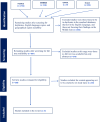Gender equality in education and community pharmacy practice in the Middle East: A systematic review of literature
- PMID: 39928772
- PMCID: PMC11813003
- DOI: 10.1097/MD.0000000000041475
Gender equality in education and community pharmacy practice in the Middle East: A systematic review of literature
Abstract
Background: Most of the world has made progress towards attaining gender equality in education and practice of healthcare. Nevertheless, in the Middle East, noting restrictive social and religious norms, there are questions as to whether such equality witnessed in other parts of the world is a reality in this region.
Methods: A comprehensive search of 4 electronic databases was carried out for literature on gender equality on education and community pharmacy practice in the Middle East. A total of 9 articles directly addressing issues on the study topic within the Middle East were included in the systematic review.
Results: The findings showed good progress in educational attainments across most of the Middle Eastern region. Women and men alike have almost equal chances in education, with some nations like Saudi Arabia having more women than men graduating from universities. However, there are high-level disparities in community pharmacy practice, where despite many of the workers in pharmacy within the region being women, their representation in top positions in pharmacy is very low. They also earn less than their male counterparts, and at times they are forced to engage in unpaid healthcare work like it recently emerged in Lebanon following the financial crisis within the nation. Barriers such as restricted mobility, gendered social roles, and discrimination at work present as the key factors fueling the inequality levels witnessed in the region in pharmacy practice.
Conclusions: The Middle East is a region that like other parts of the world, is making good progress towards equality in education. However, such equality in education appears not to translate to equal job opportunities in the practice of community pharmacy, pointing to a need for relevant stakeholders to engage in measures for addressing the identified barriers that prevent women from fully equaling men in healthcare practice for the benefit of the larger society.
Copyright © 2025 the Author(s). Published by Wolters Kluwer Health, Inc.
Conflict of interest statement
The authors have no conflicts of interest to disclose.
Figures
Similar articles
-
Gendered Experiences in Pharmacy Education Exposed Through a National Financial Collapse - A Reflection From the Lebanese Crisis.Am J Pharm Educ. 2023 Jul;87(7):100023. doi: 10.1016/j.ajpe.2022.10.004. Epub 2023 Mar 15. Am J Pharm Educ. 2023. PMID: 37380271
-
Gender equality in the 21st century: Overcoming barriers to women's leadership in global health.J Dent Educ. 2022 Sep;86(9):1144-1173. doi: 10.1002/jdd.13059. J Dent Educ. 2022. PMID: 36165260 Review.
-
Gender Norms and Gender Equality in Full-Time Employment and Health: A 97-Country Analysis of the World Values Survey.Front Psychol. 2022 May 31;13:689815. doi: 10.3389/fpsyg.2022.689815. eCollection 2022. Front Psychol. 2022. PMID: 35769749 Free PMC article.
-
Barriers and facilitators to maternal healthcare in East Africa: a systematic review and qualitative synthesis of perspectives from women, their families, healthcare providers, and key stakeholders.BMC Pregnancy Childbirth. 2025 Feb 3;25(1):111. doi: 10.1186/s12884-025-07225-8. BMC Pregnancy Childbirth. 2025. PMID: 39901111 Free PMC article.
-
A vision to advance gender equality within pharmacy leadership: Next steps to take the profession forward.Res Social Adm Pharm. 2023 Jun;19(6):965-968. doi: 10.1016/j.sapharm.2023.03.001. Epub 2023 Mar 6. Res Social Adm Pharm. 2023. PMID: 36925359
Cited by
-
The role of leadership in empowering women in medicine.Front Public Health. 2025 Jul 23;13:1607912. doi: 10.3389/fpubh.2025.1607912. eCollection 2025. Front Public Health. 2025. PMID: 40771244 Free PMC article. Review.
References
-
- Parejo PH, Radulovic B. Public policies on gender equality. In: Vujadinović D, Fröhlich M, Giegerich T, eds. Gender-Competent Legal Education. Springer Textbooks in Law. Cham: Springer; 2023.
-
- Bouhamdan TM. Religion, the law and rights of women in the Middle East: a quantitative analysis. Political Science Theses-Georgia State Univ. 2009:1. https://scholarworks.gsu.edu/cgi/viewcontent.cgi?article=1030&context=po....
Publication types
MeSH terms
LinkOut - more resources
Full Text Sources


